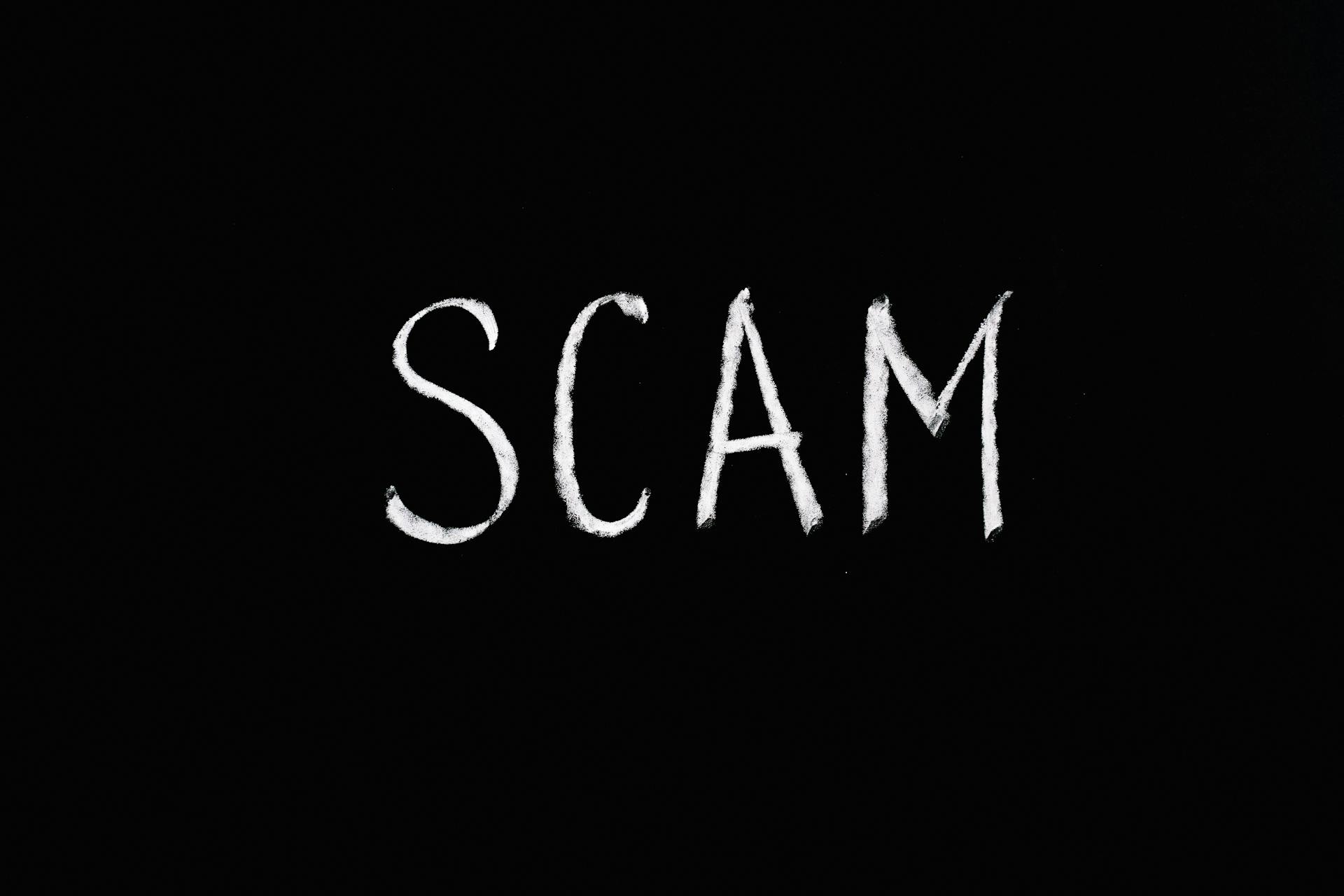
Auto insurance scams are more common than you think, and they can be costly to fall victim to. According to the article, one type of scam is the fake insurance company scam, where scammers create fake insurance companies to sell fake policies.
Be cautious of unsolicited phone calls or emails offering cheap insurance rates. These are often phishing attempts to steal your personal and financial information.
Some scammers may also pose as insurance adjusters or agents to gain your trust. They may ask for sensitive information or payment upfront, which is a red flag.
To avoid falling prey to these scams, make sure to research any insurance company or agent thoroughly before doing business with them.
Related reading: Fake Business Insurance Certificate
Types of Auto Insurance Scams
Auto insurance scams come in many forms, and it's essential to be aware of them to protect yourself. Staged auto accidents are the most common type of scam, where a person intentionally causes an accident to file a fraudulent or inflated insurance claim.
A staged accident often involves a driver intentionally blocking your path or causing a collision. Be cautious of drivers who wave you through or slow down to stop, only to have another car crash into you. This is a classic tactic used by scammers to make it seem like you're at fault.
Another common scam is towing and auto repair scams. Be wary of tow truck drivers who show up uninvited to the scene of an accident, and always do your research on a repair shop before getting your vehicle repaired. You can check the Better Business Bureau's website for information on choosing businesses and reading company profiles.
Here are some common tactics used by scammers:
- Staged accidents
- Exaggerated injuries
- Fake repair bills
- Faking injuries altogether
These scams can result in you losing money, facing financial difficulties, or even being left without coverage. By being aware of these tactics, you can protect yourself and your insurance policy.
Deflating Airbag Schemes
Deflating Airbag Schemes can be devastating, putting innocent lives at risk. Lives are at stake without working airbags, innocent drivers die in crashes with knockoff airbags.
Body shops insert cheap knockoff airbags in place of deployed ones, and your insurer is billed for the real thing. The switch happens when body shops steal your un-deployed airbag to resell it, then insert a fake or even rags and trash to fill the void.
Used and salvaged vehicles are often targeted by scammers, who install bogus or no airbags after being totaled in a flood or crash. A certified mechanic should inspect the vehicle to ensure it has working airbags before you buy.
A flashing dashboard light should indicate a functioning airbag, so if it doesn't light up when you start your vehicle, it's a problem. Check invoices to verify the body shop bought the airbag from a legitimate manufacturer or dealer.
Don't open the airbag compartment yourself, as it might explode. If you suspect a scam, report it to your auto insurer, law enforcement, and state fraud bureau.
On a similar theme: Auto Insurer
Types of Fraud
Staged accidents are a common type of auto insurance scam, where unscrupulous individuals intentionally cause an accident to file a fraudulent or inflated insurance claim.
Exaggerated injuries are another type of fraud, where individuals claim debilitating back injuries or long-term trauma from a minor bump or small collision.
Fake repair bills can also occur, where auto repair shops present inflated bills, charging for unnecessary repairs or even for services never rendered.
Faking a stolen car is another type of fraud, where individuals claim their car was stolen when it was actually abandoned or sold to cover up missed payments.
Auto insurance fraud can be described as any deceitful act meant to falsely obtain money from an insurer, ranging from staged accidents to fake injury claims.
Here are some common types of auto insurance scams:
- Staged accidents
- Exaggerated injuries
- Fake repair bills
- Faking a stolen car
- Faking injuries altogether
These types of scams can result in safety risks, higher insurance premiums, and financial losses for both the insurer and the victim.
Common Scams to Watch Out For
Staged accidents are a common scam to watch out for. A group of people might engineer a scenario where an accident is bound to occur, and then they'll portray it as if you're the one at fault, even when they intentionally caused the mishap.
Be wary of people who wave you through or out of a parking space, only to deliberately crash into your vehicle. This is known as a "drive-down" scam. Another tactic is the "swoop and squat" scam, where a vehicle darts in front and jams on its brakes, causing you to rear-end them.
To avoid falling victim to these scams, make sure to document as much information as you can at the scene of the crash, take pictures and videos, and get the contact and insurance information of the other drivers involved.
A unique perspective: Insurance Scam Car Accident
General Scams
Unlicensed insurance is a serious issue, and it's not uncommon for scammers to try to sell you insurance without a license. In Texas, for example, it's against the law to sell insurance without a license, except for surplus lines carriers who must register with the Texas Department of Insurance (TDI) to do business in Texas.
Take a look at this: Umbrella Insurance without Auto
Before you buy insurance, do your research and use TDI's License Lookup Tool to verify an insurance company, agent, agency, or adjuster. Make sure you know the company's exact name, as unlicensed companies often use similar names to licensed companies.
Telephone and email scams are also on the rise, with scammers claiming to be your insurance company or agent and asking for personal info. Legitimate companies won't call you to cancel your policy, and they're required by law to deliver or mail written notice of cancellation at least 10 days before cancelling a policy.
Here are some common scams to watch out for:
- Someone claims to be your insurance agent or from your insurance company and threatens to cancel your policy if you don't give personal information over the phone.
- Be wary of insurance companies or agents trying to sell you an insurance policy over the phone.
Fraud against seniors is also a significant issue, with scammers targeting life and health insurance policies. Be cautious when an insurance company or agent you don't know contacts you out of the blue, and make sure you and your elderly loved ones don't fall for high-pressure sales tactics or requests for personal and financial info.
Buying After Damage
Buying After Damage is a common scam to watch out for. This scam involves buying insurance coverage after a loss or damage has already occurred.
Filing a claim right after you add or change coverage is a red flag for insurance companies, and they'll likely investigate. Odds are good they'll find evidence that the damage existed before the incident.
You might think it's a good idea to save money by not carrying comprehensive coverage, but it's not worth the risk of getting caught in this scam. If a tree branch falls on your car, for example, and breaks the windshield, don't wait to add comprehensive coverage.
Curious to learn more? Check out: How Much Does Comprehensive Car Insurance Cover
Unlicensed, Dishonest Repairs
Storm chasers appear after a storm, offering "affordable" repairs. They're often unlicensed and dishonest.
Shoddy repairs using substandard material can take months to correct, causing stress and financial burden. Your claim may be denied for fraud, leaving you to pay.
Lowball bids, like "special post-disaster deals" or "limited time offers", can be a red flag. These tactics are designed to pressure you into making a quick decision.
To avoid scams, hire local, reputable contractors. Ask to see their licenses and confirm with the government licensing agency. Require proof of liability and workers-compensation insurance.
A signed contract before work begins is essential. Don't sign contracts with blanks, and never pay a contractor in full before work begins. Normally, 20 percent or less upfront is reasonable.
Here are some warning signs of unlicensed, dishonest repairs:
- Strangers appearing after a storm, offering "affordable" repairs
- Lowball bids or "special deals"
- Shoddy repairs using substandard material
- Inflating the claim, leading to denied coverage
- Asking for large up-front payments or convincing you to sign over your claim
Report any suspicious activity to your insurer, state insurance fraud bureau, and police. Your safety and financial security depend on it.
Towing: Be Aware
Towing scams are more common than you think, and they can leave you with a hefty bill and a damaged vehicle. A bandit tow truck can arrive minutes after a crash, and it's essential to know how to steer clear of towing cons.
Patrol towing is a tactic used by tow drivers who have a spotter to identify cars parked illegally. They take your car to an impound lot, and you're forced to pay out of pocket.
Inflation is another tactic used by towing companies, where they charge fees far above your auto policy limits. Watch for inflated and suspicious fees, such as inspections, photos, and administrative costs.
Steering is a tactic where a tow truck mysteriously arrives after a crash, and the driver is in cahoots with a dishonest body shop. You pay for the fraud, and it can be a nightmare to retrieve your vehicle.
Here are some red flags to watch out for:
- Out of pocket for hundreds of dollars
- Retrieving your vehicle may take days of anxiety and effort
- Bogus repairs make your vehicle unsafe and future bills you pay from your own pocket
To avoid towing scams, plan ahead by knowing your auto insurer's roadside program or joining a reputable plan. They can recommend reputable towing firms and repair shops.
Never use a towing firm that just happens to show up; ask police or your insurer for a reputable tow. You Pick: never let the tow truck driver choose the shop – call your insurer or others you trust.
When dealing with a tow truck driver, make sure to:
- Read and sign only the approval form authorizing your tow
- Get a price list up front detailing all fees
- Insist the tow driver gives you a signed damage report at the accident scene
- Refuse to deal with a towing firm demanding cash
- Never give the tow driver your insurance or other personal information
If you suspect a scam, notify your auto insurer, state insurance fraud bureau, and police.
Frequently Asked Questions
What do I do if someone applied for car insurance in my name?
Report suspected identity theft and insurance fraud by calling 1-800-TEL-NICB and notifying your insurance company immediately
What are the spam calls for auto insurance?
Auto insurance scams involve spam calls targeting your personal and financial information, often exploiting your significant investment in your vehicle. Be cautious of unsolicited calls claiming to offer auto insurance deals or updates, as they may be attempts to steal your sensitive data.
What can someone do with my car insurance policy number?
Someone with your car insurance policy number can file false claims, causing financial losses for both you and your insurance company. This is a serious risk that highlights the importance of protecting your personal and policy information.
Sources
- https://www.nicb.org/prevent-fraud-theft/staged-auto-accident-fraud
- https://www.opic.texas.gov/news/insurance-scams/
- https://insurancefraud.org/scam-alerts/
- https://www.deltoroinsurance.com/learning_center/avoiding-auto-insurance-fraud-in-florida-common-scams-and-how-to-stay-protected/
- https://www.insurance.com/auto-insurance/claims/8-common-types-of-car-insurance-fraud
Featured Images: pexels.com


